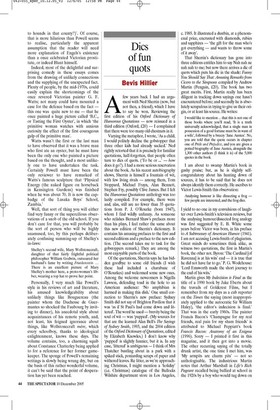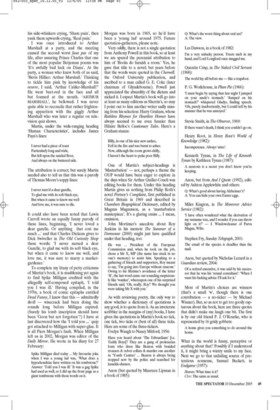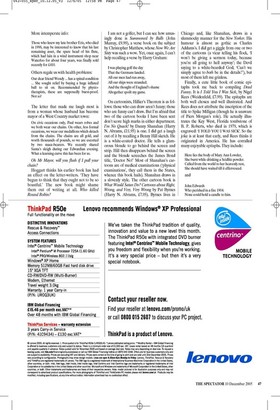Dics of fun quots
Bevis Hillier
Afew years back I had an argument with Ned Sherrin (now, but not then, a friend), which I have to say he won. Reviewing the first edition of his Oxford Dictionary of Humorous Quotations — now reissued in a third edition (Oxford, £20) — I complained that there were too many old chestnuts in it.
Varying the metaphor, I wrote, ‘As a child, I would politely decline the gobstopper that three other kids had already sucked.’ Ned rightly retorted that it is precisely for familiar quotations, half-forgotten, that people often turn to dics of quots. (‘To be or ...’ — how does it go?). I had a more serious reservation about the book. As his recent autobiography shows, Sherrin is himself a fountain of wit, with few living rivals — among them, Tom Stoppard, Michael Frayn, Alan Bennett, Stephen Fry, possibly Clive James. But I felt the Humorous Quotations anthology was too lazily compiled. For example, there were and, alas, still are no fewer than 35 quotations from P. J. O’Rourke (born 1947), whom I find wildly unfunny. As someone who relishes Bernard Shaw’s prefaces more than his plays, I feel rather the same about this new edition of Sherrin’s dictionary. It contains his amusing prefaces to the first and second editions and a preface to the new edition. (The second takes me to task for the gobstoppers remark.) They are among the most enjoyable parts of the book.
Of the quotations, Sherrin says he has bidden goodbye to some old friends (I wish these had included a charabanc of O’Rourkes) and welcomed some new ones. Among the welcome newcomers is Nigella Lawson, defending toad in the hole to an American audience: ‘No amphibian is harmed in making this dish.’ One small correction to Sherrin’s new preface: Sydney Smith did not say of Brighton Pavilion that it was ‘as if St Paul’s had come down and littered’. The word he used — brevity being the soul of wit — was ‘pupped’. (My sources for that are the learned Alan Bell’s The Sayings of Sydney Smith, 1993, and the 2004 edition of the Oxford Dictionary of Quotations, edited by Elizabeth Knowles.) I don’t know why ‘pupped’ is slightly funnier, but it is. In any case, ‘littered’ is ambiguous — I think of Mrs Thatcher bustling about in a park with a spiked stick, poniarding scraps of paper and withered leaves. Re litter, as we’re approaching Christmas, I might mention a ‘holiday’ (i.e. Christmas) catalogue of the Bullocks Wilshire department store in Los Angeles, c. 1985. It illustrated a dustbin, at a phenomenal price, encrusted with diamonds, rubies and sapphires — ‘the gift for the man who’s got everything — and wants to throw some of it away’.
That Sherrin’s dictionary has gone into three editions entitles him to say Nah nah ne nah nah to me; but now there arrives a dic of quots which puts his dic in the shade: Funny You Should Say That: Amusing Remarks from Cicero to the Simpsons compiled by Andrew Martin (Penguin, £20). The book has two great merits. First, Martin really has been diligent in tracking down sayings one hasn’t encountered before; and secondly he is absolutely scrupulous in trying to give us their origin, or at least his source. He writes: I would like to mention ... that this is not one of those books where you’ll read, ‘It is a truth universally acknowledged, that a single man in possession of a good fortune must be in want of a wife’, followed by a breezy ‘Jane Austen’. No, you are told that the quote occurs in chapter one of Pride and Prejudice, and you are given a potted biography of Jane Austen, alongside the 1,300 other authors (I think it is) of the 5,000 quotes in the book.
I am about to swamp Martin’s book in gushy praise; but, as he is slightly selfcongratulatory about his hunting down of sources, it has to be said that he does not always identify them correctly. He ascribes to Victor Lewis-Smith this observation:
Analysing humour is like dissecting a frog few people are interested, and the frog dies.
I yield to no one in my convulsions of laughter over Lewis-Smith’s television reviews, but the analysing humour/dissected frog analogy was first suggested by E. B. White some years before Victor was born, in his preface to A Subtreasury of American Humor (1941). I am not accusing Lewis-Smith of plagiarism. Great minds do sometimes think alike, as witness two quotations, the first in Martin’s book, the other not. Byron: ‘The Cardinal [of Ravenna] is at his wits’ end — it is true that he did not have far to go.’ P. G. Wodehouse: ‘Lord Emsworth made the short journey to the end of his wits.’ Martin gives My Indecision is Final as the title of a 1990 book by Jake Eberts about the travails of Goldcrest Films, but I remember from my days as a cub reporter on the Times the saying (most inappropriately applied to the autocratic Sir William Haley), ‘the editor’s indecision is final.’ That was in the early 1960s. The painter Francis Bacon’s ‘Champagne for my real friends, real pain for my sham friends’ is attributed to Michael Peppiatt’s book Francis Bacon: Anatomy of an Enigma (1996). Sorry — I printed it first in this magazine, and it then got into a movie. The other recurring saying of the totally drunk artist, the one time I met him, was ‘My armpits are charm pits’ — not so anthologisable. The industrious Martin notes that Arthur Marshall in Life’s Rich Pageant recalled being bullied at school in the 1920s by a boy who would tug down on his side-whiskers crying, ‘Sham pain’, then yank them upwards crying, ‘Real pain.’ I was once introduced to Arthur Marshall at a party, and the meeting caused the second worst faux pas of my life, after assuring Prince Charles that one of the most popular Betjeman poems was ‘It’s awfully bad luck on Diana’. At the party, a woman who knew both of us said, ‘Bevis Hillier: Arthur Marshall.’ Thinking to tickle him pink by knowledge of his oeuvre, I said, ‘Arthur Calder-Marshall?’ He went beet-red in the face and all but foamed at the mouth. ‘ARTHUR MARSHALL’, he bellowed. I was never quite able to reconcile that rather frightening apparition with the giggly Arthur Marshall who was later a regular on television quiz shows.
Martin, under the wide-ranging heading ‘Human Characteristics’, includes James Payn’s lines:
I never had a piece of toast Particularly long and wide, But fell upon the sanded floor, And always on the buttered side.
The attribution is correct; but surely Martin needed also to tell us that this was a parody of Thomas Moore’s soppy lines:
I never nurs’d a dear gazelle, To glad me with its soft black eye, But when it came to know me well And love me, it was sure to die.
It could also have been noted that Lewis Carroll wrote an equally funny parody of these lines, beginning, ‘I never loved a dear gazelle. Or anything that cost me much ...’ and that Charles Dickens gives to Dick Swiveller in The Old Curiosity Shop these words: ‘I never nursed a dear Gazelle, to glad me with its soft black eye, but when it came to know me well, and love me, it was sure to marry a marketgardener.’ To complete my litany of petty criticisms of Martin’s book, it is maddening yet again to find Spike Milligan credited with the allegedly self-composed epitaph, ‘I told you I was ill.’ Having compiled, in the 1970s, a book of comic epitaphs entitled Dead Funny, I knew that this — admittedly droll — wisecrack had been doing the rounds long before Milligan expired. (Surely his tomb inscription should have been ‘Goon but not forgotten’?) I have at last discovered how the ‘I told you ...’ quip got attached to Milligan with super-glue. It is all Piers Morgan’s fault. When Milligan left us in 2002, Morgan was editor of the Daily Mirror. He wrote in his diary for 27 February:
Spike Milligan died today ... My favourite joke when I was a young lad was, ‘What does a hypochondriac have written on his tombstone?’ Answer: ‘Told you I was ill.’ It was a gag Spike had used as well, so I did up the front page as a giant tombstone with those words on it.
Morgan was born in 1965, so he’d have been a ‘young lad’ around 1975. Future quotation-gatherers, please note.
Very oddly, there is not a single quotation from Anthony Powell in this book, so at least we are spared the perennial attribution to him of ‘Books do furnish a room.’ Yes, he gave that title to a novel; but years before that the words were quoted in the Cherwell, the Oxford University publication, and ascribed to a man called G. E. Coke (later chairman of Glyndebourne). Powell just appreciated the absurdity of the dictum and nicked it. I expect Martin’s book will go into at least as many editions as Sherrin’s, so may I point out to him another writer sadly missing from his selection: Harry Graham, whose Ruthless Rhymes for Heartless Homes have always seemed to me even funnier than Hilaire Belloc’s Cautionary Tales. Here’s a Graham stanza:
Billy, in one of his nice new sashes, Fell in the fire and was burnt to ashes. Now, although the room grows chilly, I haven’t the heart to poke poor Billy.
One of Martin’s subject-headings is ‘Masturbation’ — not, perhaps a theme the OUP would have been eager to explore in the days when Sir Arthur Quiller-Couch was editing books for them. Under this heading Martin gives us nothing from Philip Roth’s novel Portnoy’s Complaint, first published in Great Britain in 1969 and described in Chambers Biographical Dictionary, edited by Magnus Magnusson, as a ‘masturbation masterpiece’. It’s a glaring emiss ... I mean, omission.
John Mortimer’s anecdote about Roy Jenkins in his memoir The Summer of a Dormouse (2000) might just have qualified under that heading, too:
He was ... President of the European Commission and, when he took on the job, chose a Mr X, MP (the name has stuck in no one’s memory) to assist him. Speaking to a gathering of friends and supporters, Roy meant to say, ‘I’m going into Europe without rancour.’ Owing to his lifetime’s avoidance of the letter ‘R’, the last word came out sounding suspiciously like ‘wanker’, whereupon one of his surprised friends said, ‘Oh, really, Roy? We thought you were taking Mr X with you.’
As with reviewing poetry, the only way to show whether a dictionary of quotations is any good, is to quote from it. As an inveterate scribbler in the margins of (my) books, I have given the quotations in Martin’s book no tick, one tick, two ticks or (best of all) three ticks. Here are some of the three-tickers.
Evelyn Waugh to Nancy Mitford, 1954:
Have you heard about ‘The Edwardians’ [i.e. Teddy Boys]? They are a gang of proletarian louts who dress like Beaton with braided trousers & velvet collars & murder one another in ‘Youth Centres’ ... Beaton is always being stopped now by the police and searched for knuckle-dusters.
Anon (but quoted by Maureen Lipman in a book of 1985):
Q: What’s the worst thing about oral sex? A: The view.
Les Dawson, in a book of 1982:
I’m a very unlucky person. Treets melt in my hand, and Lord Longford once mugged me.
Quentin Crisp, in The Naked Civil Servant (1968):
The world lay all before me — like a trapdoor. P. G. Wodehouse, in Plum Pie (1966): ‘I must begin by saying that last night I jumped on your uncle’s stomach.’ ‘Jumped on his stomach?’ whispered Gladys, finding speech. ‘Oh, purely inadvertently, but I could tell by his manner that he was annoyed.’
Stevie Smith, in The Observer, 1969:
If there wasn’t death, I think you couldn’t go on.
Henry Root, in Henry Root’s World of Knowledge (1982):
Incompetence. Always ‘utter’.
Kenneth Tynan, in The Life of Kenneth Tynan by Kathleen Tynan (1987):
A neurosis is a secret you don’t know you’re keeping.
Anon, but from And I Quote (1992), edited by Ashton Applewhite and others:
Q: What’s good about having Alzheimer’s? A: You can hide your own Easter eggs.
Miles Kington, in The Moreover Advice Service (1982):
‘I have often wondered what the derivation of my surname was, and I wonder if you can throw light on it?’ — J. Windowcleaner of Parva Magna, Wilts.
Stephen Fry, Sunday Telegraph, 2001:
The email of the species is deadlier than the mail.
Anon, but quoted by Nicholas Lezard in a Guardian review, 2004:
Of a retired executive, it was said by his successor that he was his ‘sexual consultant’: ‘When I want his fucking advice I’ll ask for it.’
Most of Martin’s choices are winners (that’s a small ‘w’, though there is one contribution — a no-ticker — by Michael Winner). But, so as not to get too gooily rapturous about the book, here are three quotes that didn’t make me laugh one bit. The first is by our old friend P. J. O’Rourke, who is represented by 16 grisly gobbets:
A home gives you something to do around the house.
What in the world is funny, perceptive or anything about that? Possibly if I understood it, it might bring a wintry smile to my face. Next we go to that unfailing source of pretentious nonsense, Samuel Beckett, in Endgame (1957): Hamm: What time is it? Clov: The same as usual. Meaningless crap. And finally Gerard Hoffnung. He did draw quite amusing cartoons of orchestras. But he used to irritate me in the 1950s, on a radio programme on which celebrities had to speak for a short time on given subjects. Whatever the subject — an egg, a metronome, a frying-pan, a roll of linoleum — Hoffnung would always begin his answer, in his high, squeaky voice, ‘My grandmother was a frying-pan [etc] ...’ Mildly funny the first time, but not thereafter and this isn’t at all funny now:
I was born at a very early age. As a matter of fact, I was two when I was born, I remember it very well.
Puerile bilge. And, yes, I have heard the recording of his speech at the Oxford Union, with its obbligato of braying student laughter. I didn’t join in.
The funniest book of last year was Simon Hoggart’s send-up of those awful Christmas ‘round robin’ letters that tend to begin ‘Dear All.’ It was called The Cat that Could Open the Fridge, and I thought it would be impossible for him to better it. But his new assault on round robins, The Hamster that Loved Puccini (Atlantic Books, £9.99), is even funnier. When people try to be funny in their Christmas letters, they usually aren’t. As with pictorial or 3-D kitsch, it is unconscious maladroitness (like the ghastly swan picture on the wall in Abigail’s Party) that provokes helpless laughter. A lot more ticks went into the margin, but at times I could hardly hold the pen through paroxysms of cachinnation, or focus on the page through tears of mirth.
Hoggart divides the letter-writers into categories. First come the proud parents. One son is stacking for Tesco’s on Friday evenings and Saturday afternoons:
He had one lady ask him if Tesco’s sold pantyliners for thongs — I ask you! — and another who wanted salt without any additives.
A daughter’s promising musical career has come to grief:
Megan sadly had to back out of playing her horn solos because of problems with her lip ... It seems that she has suffered what is known as an embouchere collapse.
Another couple think the festive season will be enlivened by an account of their son’s potty training:
We started the task during the summer holidays, but although he’ll sit on the potty and see results time after time after time, he just won’t ask to use it. We got so fed up with the fact that he went through all his trousers, undies and socks that in the end we’ve kept him in pull-ups.
Then there are the self-congratulators, with their luxury hols:
Costa Brava for a boys’ week was as enjoyable as ever. Tom appointed me chainsaw expert to cut down overgrown bougainvilleas, etc.
Sometimes, admittedly, the holidays go wrong:
Our carriage contained a skinhead nutter, cackling and muttering maniacally. Many people avoided eye contact, but Alex befriended him by doing impressions of various cartoon characters.
Family weddings are dwelt on with gurgling delight:
A lovely event was the marriage in July of Iain and Megan, his partner of some eleven years. They did the legal bit at the Register Office . . . Later, Megan donned her clog-dancing costume, and performed with her clog-morris team.
One recurring sin of the round-robiners is what Hoggart calls ‘intemperate information’. Enough, enough, he feels, as he reads:
Gifts received this year have included a towel ring for the bathroom, a handsome set of table mats showing West Country buildings ... and one of those curled metal things that expand for you to put books in. You don’t see those much any more, and I suspect it came from a charity shop.
An even less welcome gift:
Jeremy brought me back a present he had bought at Toronto airport, in haste ... It was a chunky metal bracelet. Unfortunately it was too small for me, so we now use it for poaching eggs.
More intemperate info:
Those who knew my late brother Eric, who died in 1998, may be interested to know that his last remaining asset, the spare head of his flute, which had lain in a wind instrument shop near Waterloo for about four years, was finally sold recently for £410.
Others regale us with health problems:
Our dear friend Wendy ... has a spinal condition ... She sought relief by buying a huge inflated ball to sit on. Recommended by physiotherapists, these are supposedly burst-proof. Not so!
The letter that made me laugh most is from a woman whose husband has become mayor of a West Country market town:
On civic occasions only, Paul wears robes and we both wear our chains. On other, less formal occasions, we wear our medallions which detach from the chains. The chains are all gold, and worth thousands of pounds, so we are escorted by two mace-bearers. We recently shared Santa’s sleigh during our Edwardian evening. What a learning curve this has been for us.
Oh Mr Mayor, will you flush if I pull your chain?
Hoggart thinks his earlier book has had an effect on the letter-writers. ‘They have begun to think that they ought not to be so boastful.’ The new book might shame them out of writing at all. Who killed Round Robin? I am not a golfer, but I can see how amusingly done is Summoned by Balls (John Murray, £9.99), a verse book on the subject by Christopher Matthew, whose Now We Are Sixty was such a wow. Yet, once again, I can’t help recalling a verse by Harry Graham:
I was playing golf the day That the Germans landed.
All our men had run away, All our ships were stranded; And the thought of England’s shame Altogether spoilt my game.
On cartoonists, Hillier’s Theorem is as follows: those who can draw aren’t funny; those who are funny can’t draw. But I’m afraid that two of the cartoon books I have been sent don’t score high marks in either department. I’m No Quack! by Danny Shanahan (Harry N. Abrams, £11.95) is one. I did get a laugh out of it by recalling a Benny Hill sketch. He is a white-coated doctor. He tells a glamorous blonde to go behind the screen and strip. Hill then disappears behind the screen and the blonde screeches the James Bond title, ‘Doctor No!’ Most of Shanahan’s cartoons are of medical examinations (‘physical examinations’, they call them in the States, whence this book hails). Shanahan draws in a slovenly style. The other cartoon book is What Would Satan Do? Cartoons about Right, Wrong, and Very, Very Wrong by Pat Byrnes (Harry N. Abrams, £7.95). Byrnes lives in Chicago and, like Shanahan, draws in a slummocky manner for the New Yorker. His humour is almost as gothic as Charles Addams’s. I did get a giggle from one or two of the cartoons (a vicar telling his flock, ‘I won’t be giving a sermon today, because you’re all going to hell anyway’; the Devil saying to a white-bearded God, ‘Can’t we simply agree to both be in the details?’), but most of them left me grinless.
Finally, a cute little book of comic epitaphs took me back to compiling Dead Funny. It is I Told You I Was Sick, by Nigel Rees (Weidenfeld, £7.99). The epitaphs are both well chosen and well illustrated. And Rees does not attribute the inscription of the title to Spike Milligan (though he is unaware of Piers Morgan’s role). He actually illustrates the Key West, Florida tombstone of B. P. Roberts, who died in 1979, which is engraved: ‘I TOLD YOU I WAS SICK’. So the joke is at least that early, and Rees thinks it originated in America. He has corralled many enjoyable epitaphs. They include:
Here lies the body of Mary Ann Lowder, She burst while drinking a Seidlitz powder. Called from the world to her heavenly rest, She should have waited till it effervesced.
and
John Edwards Who perished in a fire 1904. None could hold a candle to him.




























































 Previous page
Previous page